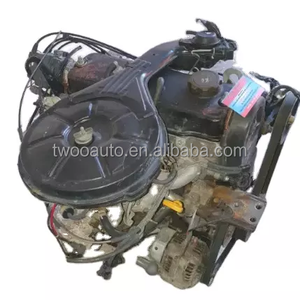Get Back when traveling: Toyota Tazz Engine for Sale, Best Offers Wait For
Get Back when traveling: Toyota Tazz Engine for Sale, Best Offers Wait For
Blog Article
Engine Buying Professional Tips on Selecting the Right Engine for Your Certain Requirements
Picking the ideal engine for your details requirements involves an intricate interaction of aspects that go beyond plain horsepower figures. By diving into the intricacies of power versus efficiency, evaluating gas rankings, and budgeting for long-term prices, one can really enhance their engine choice.
Power Vs. Efficiency: Locating the Equilibrium

When choosing an engine, it is vital to strike a balance in between power and efficiency to meet your details requirements effectively. Power describes the engine's ability to generate energy for propulsion, figuring out aspects like acceleration, towing capacity, and total efficiency (Toyota Tazz Engine For Sale). On the other hand, effectiveness connects to exactly how well the engine uses fuel to generate power, impacting factors such as fuel economic climate and ecological friendliness
Attaining the right equilibrium between power and performance is vital due to the fact that an engine that is too powerful may eat excessive gas, causing greater operating prices and unneeded strain on the environment. Alternatively, an engine that prioritizes effectiveness over power may lead to slow performance, particularly popular scenarios like lugging hefty tons or driving uphill.
To make an educated decision, think about elements such as your regular driving conditions, the desired use the automobile, and your individual preferences. By reviewing your requirements and priorities, you can choose an engine that strikes the best equilibrium between power and effectiveness, guaranteeing ideal performance while minimizing environmental influence and operating costs.
Comprehending Engine Dimension and Type

Common engine types consist of inline engines, V engines, and rotating engines, each with its unique advantages and downsides. Understanding the interaction between engine size and type is essential in selecting an engine that straightens with your particular requirements and priorities, whether it be power, performance, or a balance of both.
Consider Your Vehicle's Demands
Considering your lorry's requirements is a fundamental action in the engine option procedure to make sure ideal performance and performance. It is crucial to assess elements such as the meant use of the car, its weight, pulling ability, and gas effectiveness requirements. For instance, if you are searching for an engine for a durable truck that will be utilized for towing, you will certainly need a powerful engine with high torque abilities. On the other hand, if you are selecting an engine for a portable auto mostly utilized for city commuting, fuel efficiency may be an extra critical factor to think about.

Assessing Fuel Performance Scores
Analyzing gas effectiveness ratings is a critical aspect of picking the best engine for your lorry, making certain cost savings and ecological sustainability. Gas performance ratings, usually measured in miles per her response gallon (MPG) for gas engines or kilowatt-hours per 100 miles (kWh/100 miles) for electrical engines, suggest just how much a vehicle can travel useful content on a certain quantity of gas or electrical energy. Higher MPG or reduced kWh/100 miles worths signify more effective engines, converting to reduced fuel costs and lower carbon discharges.
In addition, compare different engine choices within the exact same vehicle course to identify the most affordable option. Aspects such as engine size, weight, the rules of aerodynamics, and hybrid or electrical capabilities can all influence fuel efficiency.
Budgeting for Long-Term Costs
Strategically preparing for long-term expenses is critical when picking an engine, guaranteeing financial sustainability over the car's life-span. While the initial purchase cost of an engine is a considerable element, it is essential to consider the long-term expenses related to upkeep, repair work, and fuel intake. Selecting a much more fuel-efficient engine may have a higher in advance price but can lead to considerable savings with time. Normal upkeep, such as oil modifications, filter substitutes, and tune-ups, is necessary to keep the engine running smoothly and efficiently, lowering the danger of pricey repair services down the line.
In addition, looking into the accessibility and cost of substitute components for the picked engine is important in budget plan preparation. Engines with readily available and cost effective components can significantly impact lasting upkeep expenditures. In addition, considering the go to the website engine's durability and anticipated lifespan can aid prevent unexpected substitute prices in the future. By thoroughly budgeting for these lasting costs and factoring them into the decision-making procedure, people can pick an engine that not just fulfills their immediate demands but likewise continues to be cost-effective throughout its lifespan.
Verdict
Finally, picking the ideal engine for your specific requirements calls for balancing power and performance, recognizing engine dimension and type, considering your vehicle's requirements, assessing fuel effectiveness rankings, and budgeting for long-term costs. By carefully considering these factors, you can make certain that you select an engine that satisfies your needs and gives ideal efficiency for your vehicle.
To further refine the selection procedure of an engine that strikes the optimum balance between power and efficiency, it is vital to dig into the complexities of recognizing engine size and kind. Engine dimension refers to the overall quantity of air and gas that can be pushed with the engine cylinders. Usual engine types include inline engines, V engines, and rotating engines, each with its one-of-a-kind benefits and disadvantages. Recognizing the interplay between engine size and kind is vital in choosing an engine that aligns with your particular needs and top priorities, whether it be power, effectiveness, or a balance of both.
Gas efficiency scores, normally gauged in miles per gallon (MPG) for gasoline engines or kilowatt-hours per 100 miles (kWh/100 miles) for electric engines, suggest just how far a lorry can take a trip on a specific quantity of gas or electricity.
Report this page